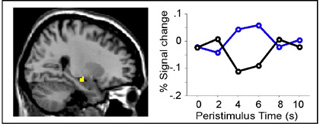Course Description
Memory is not a unitary faculty, but rather consists of multiple forms of learning that differ in their operating characteristics and neurobiological substrates. This seminar will consider current debates regarding the cognitive and neural architectures of memory, specifically focusing on recent efforts to address …
Memory is not a unitary faculty, but rather consists of multiple forms of learning that differ in their operating characteristics and neurobiological substrates. This seminar will consider current debates regarding the cognitive and neural architectures of memory, specifically focusing on recent efforts to address these controversies through application of functional neuroimaging (primarily fMRI and PET).
Course Info
Instructor
Departments
Learning Resource Types
assignment
Written Assignments

The hippocampus (yellow region) is more active during conscious remembering (blue line) of the past, relative to when memory is based on stimulus familiarity (black line). (Image by Prof. Anthony Wagner.)








